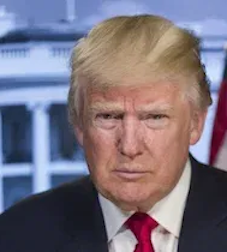Ian Linden: Trump's Second Coming: Why and how did he win?

Donald Trump
Answers abound. But, after barely two weeks of President Trump's executive orders, the nagging question still persists. Why and how did he win for a second time? This isn't idle speculation if he is to be resisted.
The most frequent explanation of Trumps' victory is economic: the consequences of spectacular inequality, not least three super-billionaires earning as much as fifty percent of the American population combined, and Trump's claims that he would deal with the high cost of living. After many years of stagnant salaries, inflation experienced by millions of workers led to their rejection of an urban elite and identification with those who challenged the injustice of it all. Trump's own resentment is real coming from his past as a vulgar upstart shunned by sophisticated New York. Populist resentment stems from feeling humiliated 'losers' - a favorite Trump word - living lives blighted by inflation in a world of winners celebrating their wealth.
As the Irish author and journalist, Fintan O'Toole, argues, promote a shared resentment, add showmanship and self-parodying humour and you have the key ingredients of Trump's appeal. Trump's campaign benefited from the massive multiplier effect of social media unavailable to a former entertainer, Ronald Reagan, his more amiable, avuncular Presidential prototype. In 1980, Reagan's campaign slogan was 'Let's Make America Great', he believed in conspiracies (communist not deep-state), and somehow turned ignorance into a virtue and source of authority. President Reagan, the charmer, won the Republican heart. President Trump, the con-man, stole the Republican soul.
A feature of Trump's rallies and public performances that doesn't get much mention is his description of America's glorious past destroyed by a criminal elite - a portrayal which summons like a genie out of a bottle a sense of victimhood. Voicing "we the people" while speaking of the richest most powerful country in the world, one that has maintained its macroeconomic success during hard times globally, he presents himself as at one with the victims he has come to save. An extraordinary elision. Trump may be ignorant but he is far from politically stupid and he shows remarkable - frightening - skills of persuasion. In his second Inauguration speech on January 20th. we got a gala performance.
Some of that Inauguration speech was old Hollywood. We had the American spirit forged by the demands of the 'Frontier', the scenic backdrop to the 'American dream', the values and freedom of the big spaces, the wagons rolling West across the prairies. Older readers will remember Saturday morning pictures, the circled wagons surrounded by fierce Red Indian horsemen shot down by brave cowboys. I did vaguely notice that, close-up, the 'Injuns' looked rather like the cowboys with heavy makeup and bows and arrows. At the time, all good clean fun. It never occurred to me that I was watching a fictionalized version of the slaughter and expropriation of America's indigenous population.
Trump's uplifting, manipulative nostalgia did not include the words cotton or slaves, words which might have tempered enthusiasm for one of the origins of America's economic success. But mention of plantation slavery, lynching, disenfranchisement and discrimination would have been a sign of belonging to the urban elite, unpatriotically 'woke' when the glorious past for MAGA was bespoke. Since it was Martin Luther King Day, a black pastor from Detroit, Rev Lorenzo Sewell, did speak of King's famous dream during the Inauguration Benediction, but only some 10 black people, including Barack Obama, were visible in the Capitol Rotunda, capacity 600 - though camera angles were very controlled.... To read on see: www.ianlinden.com/latest-blogs/trumps-second-coming-why-how-did-he-win
Professor Ian Linden is Visiting Professor at St Mary's University, Strawberry Hill, London. A past director of the Catholic Institute for International Relations, he was awarded a CMG for his work for human rights in 2000. He has also been an adviser on Europe and Justice and Peace issues to the Department of International Affairs of the Catholic Bishops Conference of England and Wales. Ian chairs a new charity for After-school schooling in Beirut for Syrian refugees and Lebanese kids in danger of dropping out partnering with CARITAS Lebanon and work on board of Las Casas Institute in Oxford with Richard Finn OP. His latest book was Global Catholicism published by Hurst in 2009.
LINK
Professor Ian Linden: www.ianlinden.com/


















